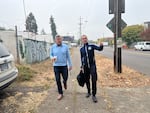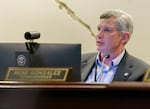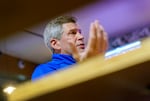Rene Gonzalez has his eye on the ball.
The 50-year-old Portland city commissioner is standing midcourt during a game of futsal — a form of indoor soccer — watching a ball soar in the air above him. He jumps, closing his eyes for a moment as he heads the ball toward the opposing team’s goal. It falls short.
Gonzalez spends several nights a week at Rose City Futsal, a gym in Northeast Portland where staff and players know him as Rene, the enthusiastic soccer nut, not the polarizing political newcomer.

Portland City Commissioner Rene Gonzalez, center, during a league game at Rose City Futsal in Portland, Feb. 12, 2024. Gonzalez is running for for Portland Mayor, saying he will focus on restoring Portland’s image and “livability.”
Kristyna Wentz-Graff / OPB
“It’s super important for my mental health to just connect with people on a normal, human level,” said Gonzalez, as he laced up his neon yellow shoes before a February evening match.
Gonzalez is the child of a Mexican immigrant, a parent of three and a former business owner. Asked what identity drives his leadership decisions, Gonzalez first points to his experience as an athlete.
“It’s being able to articulate vision, keeping people positive when they’re down and holding them accountable when their head gets a little bit big,” he said.
Like a fast-paced futsal match, Gonzalez’s first year in office has drawn moments of intense scrutiny and focus, unexpected plays, all-out sprints, and strained relationships. Some agree that he’s a team player, while others see a competitive man focused on his own singular success. And, by most accounts, he has failed to score a goal.
Perhaps more important is the way he’s been perceived from the stands.
To some, Gonzalez is the savior Portland needs to pacify a city under threat by crime and leftist policies. To others, he’s a villain, using his position as the least progressive council member (but far from conservative) to harm the city’s most vulnerable residents. With just over a year in office under his belt, he’s accomplished little to fully embody either of those caricatures.
But he has made sure to keep Portlanders’ attention trained on him.
Less than a year into office, Gonzalez announced his campaign for mayor. He’s running against two of his fellow commissioners, neither of whom would speak on the record about his leadership.
It’s a polarizing time in Portland politics, with anxieties about the city’s present and future at a high point. Gonzalez’s brief time in office has centered on harnessing that energy. But how much credit can he take for the city’s revitalization or demise?
Pandemic sparked activism
Gonzalez didn’t set out to pursue politics. After graduating high school in Alaska, Gonzalez delayed college to travel across Europe and play with different soccer leagues. He eventually landed in Salem, where he studied law — and played soccer — at Willamette University.
His first job out of law school was at the Portland law firm Stoel Rives as a real estate attorney. Darian Stanford, a lawyer who worked with him in 2000, described Gonzalez as “serious and hardworking” and someone his colleagues naturally gravitated toward. But he wasn’t a politician.
“Some people wear their political motivations on their sleeve,” Stanford said. “Rene, no one would have thought that in any shape or form. He never mentioned politics.”
But 2020 brought a change for Gonzalez. At the time, Gonzalez was running his own legal firm called Eastbank, while volunteering as the president of Oregon’s largest youth soccer club, United PDX.
As he saw the COVID-19 pandemic shutter schools and youth sports, Gonzalez organized with other parents to form a group called ED 300, which lobbied the governor’s office to reopen public schools — months before a COVID-19 vaccine was developed. The now-defunct group drew criticism from teachers unions fearing that a return to classroom learning without vaccines could put teachers’ and students’ lives at risk.
Some Portland civil rights leaders condemned Gonzalez’s group for endorsing Oregon school board candidates who were backed by organizations with anti-LGBTQ beliefs, like the Oregon Family Council. Gonzalez defended those endorsements at the time, noting that ED 300′s priority was endorsing candidates eager to get kids back in schools.
Gonzalez’s only regrets, he says now, are that he didn’t fight more to reopen schools. He feels strongly that the months of closures and canceled extracurricular activities permanently scarred a generation of kids.
“It haunts me that we didn’t do more,” he said, “that we didn’t get them open faster. I wish we would’ve pushed harder and fiercer.”
ED 300 gave Gonzalez a training ground to build his political muscles by organizing protests and lobbying elected officials. Frustrated with the way he saw leaders guiding the city out of the pandemic, he saw an opportunity to invest in the place he called home for decades.
“It’s not all that easy to just get up and leave,” Gonzalez said. “I mean, when you’re raising kids in the city, and you put your whole career here, there’s no choice but to fight. And it’s a once in a lifetime opportunity to shape the history of a city and lead.”
Gonzalez describes himself both as a “Biden Democrat” and someone who often feels “politically homeless” in liberal Portland. He says that’s because he embraces most broad progressive values, like combating climate change, supporting reproductive rights and advocating for immigrant communities, but his perspectives on criminal justice and homelessness veer from the party line. His support for tougher criminal penalties for low-level drug offenders, skepticism of calls for civilian oversight of police, and advocacy for increased homeless sweeps has iced him out of progressive spaces. In 2022, Multnomah County Democrats published a blog post detailing how Gonzalez’s values do not align with their organization’s platform.
“It sometimes feels like, if you question even one of the progressive talking points, it’s like you’re a heretic,” Gonzalez said. “It’s impermissible.”

FILE: Then-Portland City Council candidate Rene Gonzalez walks in Portland's Woodlawn neighborhood with campaign manager Shah Smith in October 2022.
Rebecca Ellis / OPB
Gonzalez’s 2022 City Council campaign focused more on who he wasn’t instead of who he was. He pitched himself as the antidote to incumbent Commissioner Jo Ann Hardesty, the city’s most progressive council member at the time.
Hardesty had championed several policies that Gonzalez considered detrimental to the city, like budget cuts to the Police Bureau following 2020′s racial justice protests and the creation of a new tax on companies’ retail sales that funds green energy programs. Presenting himself as a “cheerleader” for law enforcement and the everyman Portlander fed up with status quo governance, Gonzalez emerged victorious.
After narrowly beating Hardesty with 53% of the vote, Gonzalez tweeted on election night: “Time to restore Portland!”
Touting his victories
He believes he has done just that in his 13 months in office.
“I always say that we [our office] inherited a good city,” Gonzalez told OPB in February. “But right now all of that is sort of being tested. And we are influencing it in real time.”
Much of his stated victories are tied to his work overseeing city bureaus, like Portland Fire & Rescue and the Bureau of Emergency Communications. He pointed to 911 call response times decreasing under his watch, and he has focused on restructuring pieces of the Fire Bureau’s budget to combat soaring overtime costs.
Another action Gonzalez considers a success: banning all fire bureau staff from distributing tents and tarps to people living outdoors. That included staff with Portland Street Response, a first response team focused on assisting unhoused people, who said that distributing tents builds trust and keeps people alive through the winter. Gonzalez argued the ban was an immediate way to address fires at homeless encampments.

FILE: Portland City Commissioner of Public Safety, Rene Gonzalez, during a meeting of the Portland City Council, May 31, 2023.
Kristyna Wentz-Graff / OPB
Gonzalez said his “biggest win” was advancing a city ordinance to ban public drug use, a policy that can’t go into effect without action from the state Legislature. He also took credit for getting the city and the city’s police union, the Portland Police Association, to agree on a body worn camera policy last April.
“I got a call from the union, and it sounded like they were willing to compromise on some things they had previously not,” said Gonzalez. “So, I became a strong advocate. I said, ‘Let’s get this done. Let’s take the deal and if it doesn’t work, we can tweak it.’ I’m proud of that.”
The PPA did not respond to OPB’s request for comment about Gonzalez’s advocacy.
Many of these victories are shared successes. The hiring increase that led to decreased 911 response times was on course before he took over the Bureau of Emergency Communications, and the public drug use ban was introduced in collaboration with Mayor Ted Wheeler.
But there are areas where he’s tried to stand out. Gonzalez, who’s often seen wearing a fleece jacket emblazoned with the Portland Fire & Rescue logo, said he’s focused on uplifting first responders, through posting a social media photo celebrating new police recruits or visiting firefighters at each of Portland’s 31 fire stations during staff meetings.
“That’s partially to drive retention, to drive recruitment,” he said. “But it’s also making sure people who really felt beat down in the pandemic are appreciated.”
Both the PPA and the Portland Fire Fighters’ Association, the unions representing rank-and-file police, firefighters and EMTs, endorsed Gonzalez’s 2022 council run. According to Isaac McLennan, president of the Portland Fire Fighters Association, Gonzalez’s focus on supporting first responders is working.
“He’s gone to every fire station and made a point to listen to rank and file [firefighters’] concerns. He genuinely wants to know what’s going on, and what he can do to help,” McLennan said. “And then he articulates those interests in council, when budget talks come.”
This dynamic is missing in another first responder program Gonzalez oversees: Portland Street Response. OPB spoke with two Street Response employees who requested anonymity to avoid retaliation from management. Last year, a Street Response employee was placed on paid leave after expressing concerns with the program to The Oregonian/OregonLive.
The employees who spoke with OPB have worked for the program since Gonzalez took over in early 2022. They say that they’ve never seen Gonzalez visit their offices to talk with staff.
Gonzalez’s staff disputed the characterization and said that the commissioner toured PSR’s office once last summer and has gone on several ride-alongs with Street Response employees.
Unlike in the fire bureau, Street Response staff say his office has never asked them for their input on budget decisions, let alone policy changes that impact their work — like banning the distribution of tents, tarps, limiting food options, and other items that help keep people living outside warm.
“Right now, the only kind of clothing we’re allowed to distribute is disposable paper scrubs — like what you wear in a medical exam,” said one of the PSR employees. “It’s offensive.”
To staff, Gonzalez’s lack of engagement is reflected in the way he talks about Portland Street Response.
“He berates us in the press,” the employee said. “He’s never tried to actually meet with us. We’re professionals. We’re experts trying to run a pilot program, and he has a chance to lead us. Why throw that away?”
In June, Gonzalez characterized Portland Street Response employees as “police abolitionists” in an interview with OPB, and told the Oregonian/OregonLive that the program was driven by a “political mission.”
Absent clear communications, Street Response staff are left to assume the worst.
“The underlying message we get from Gonzalez is that these people we serve, their wellbeing is not valued,” said the second Portland Street Response employee. “You feel his contempt through these decisions.”
Regardless, Gonzalez’s days leading Portland Street Response are numbered. He is currently in negotiations with Wheeler to relocate the program into the Community Safety Division, which is overseen by the mayor. Starting in 2025, elected officials will no longer have direct authority over city bureaus and their programs.

Undated photos supplied by the city of Portland show members of the Portland Street Response team at work.
Courtesy of the city of Portland
Others see Gonzalez genuinely representing the city’s needs. Jim Mark, CEO of Portland real estate company Melvin Mark, said dysfunction on Portland City Council was “at an all time high” before Gonzalez stepped in. He also credits the leadership of Commissioners Mingus Mapps and Dan Ryan to this improvement. Mark attributes the drop in visible tents and tarps dotting Portland streets — something that impacts investors’ interest in building in Portland — to Gonzalez. Mark, who has donated to Gonzalez’s mayoral campaign, attributes Gonzalez’s success to his nonpolitical background.
“We need people who aren’t career politicians to lead,” Mark said. “He said, ‘I’m going to take time off from my business life and contribute to democracy.’ We need more of that.”
Mark, one of many local real estate leaders who endorsed Gonzalez’s council candidacy, said Gonzalez has always made himself available to meet to listen to his concerns.
But that’s not a universal experience. Several community leaders in Portland expressed to OPB that it’s been challenging to meet with the new commissioner.
Kaia Sand is the director of Street Roots, a nonprofit that advocates for people experiencing homelessness, and had recently helped lead the group Friends of Portland Street Response. The group has lobbied Gonzalez’s office to fund the first response program to allow it to expand to a 24-7 schedule, an expansion initially promised to take place in January 2023 but has yet to happen. Sand said she’s had three meetings with Gonzalez canceled.
“It started to feel a little like death by a thousand canceled meetings,” Sand said. “Just to wear us down.
Gonzalez’s staff disagrees with this version of events.
Sand said it’s been historically easy for her to set meetings with elected officials on topics related to homelessness, which the City Council has unanimously identified as one of the city’s top priorities. Those meetings are especially important, Sand said, if people with expertise on an issue — like those experiencing homelessness — are at the table.
“You need to have people in the room who are drawing on what’s happening on the ground,” she said. “Politicians need to understand — how they fill their calendars shows where their values are.”
Learning curve
Gonzalez has also made himself scarce in City Hall.
OPB spoke with five city staffers who work closely with Gonzalez’s office — both people in bureaucratic positions and political staffers. All asked to remain anonymous. They don’t see Gonzalez embodying the team player energy he touts on the futsal court.
Most pointed to the commissioners’ apparent unwillingness to meet with bureau directors or other commissioners to be briefed on proposals before they appear on the council agenda. They said this has led to Gonzalez expressing confusion at the dais, seeking complicated answers that could have been resolved earlier, and eating up meeting time.
Several mentioned Gonzalez’s recent response to the city’s updated housing development rules, a time-sensitive proposal brought to council by Commissioner Carmen Rubio. Gonzalez floated concerns about how the new regulations could disincentivize construction, and questioned how the proposed decision was made. At the time, Rubio’s staff explained that they had given Gonzalez weeks to share concerns and propose amendments. But he waited until the hearing to raise alarm.
Smith, Gonzalez’s chief of staff, said he emailed the amendments to Wheeler’s office a week before the proposal was introduced at council.
Unlike his peers on council, Gonzalez has no previous experience working for or with the city. While Gonzalez may have entered City Hall hot, pushing forward ideas — like a tent ban — with little discussion, some say he’s begun to slow down and seek guidance from more tenured commissioners before barreling ahead.
He’s not operating in a particularly challenging landscape. The current makeup of Portland City Council is arguably the most politically homogeneous in recent history, with most votes passing unanimously with little debate. Yet Gonzalez seems to prioritize expediency over partnership — and ultimately, success — at the dais.
For example, last summer, Gonzalez announced a proposal to introduce a ballot measure that would roll back parts of a voter-approved plan to overhaul the city’s current form of government. While he initially had the support of Commissioner Dan Ryan, the other members of the council were blindsided and criticized the idea in a public hearing. The proposal died a week later.
Others point to Gonzalez’s idea to use money from the city’s Clean Energy Fund to alleviate financial concerns raised by striking teachers at Portland Public Schools last fall. If he had checked with his colleagues first, Gonzalez may have remembered that he had already voted two months prior to do just that, as part of a larger council funding package. No additional funding came forward.
Gonzalez’s approach also irks elected officials outside of City Hall. Last month, he introduced a nonbinding city resolution that, if approved, would urge the Multnomah County chair to change an ambulance staffing requirement to expedite emergency response times in the region.
Chair Jessica Vega Pederson said Gonzalez never called her.
“He never reached out to me,” she said. “It’s incredibly disappointing. When you’re calling on another elected to act, you want to at least pick up the phone first.”
Gonzalez said that he met with Vega Pederson in person the day before he brought the resolution to council and that he had been in “direct conversation” with her about ambulance staffing issues for at least a year prior.
Gonzalez’s actions drew a different response from other elected officials. Gresham City Councilor Vince Jones-Dixon said he was thrilled that Gonzalez chose to hold a press conference on his ambulance staffing demands at a fire station in the Centennial neighborhood, which borders Gresham. Both Portland and Gresham firefighters operate out of that station.
“He didn’t have to do that,” said Jones-Dixon, who is currently running for a seat on the Multnomah County Board. “It showed genuine partnership that we don’t always see in east [Multnomah] county.”
Gonzalez was also joined at that press conference by Multnomah County Commissioner Julia Brim-Edwards, another political ally. Brim-Edwards said Gonzalez has proven to be someone who thinks “outside the box” when it comes to resolving regional problems.
“He’s not bound by ‘This how we’ve always done it,’ or ‘This is always how the relationship has been,’” she said. “He has a willingness to look at things differently.”
The public image
Gonzalez admits he’s still learning the ropes of politics. He points to several examples of decisions he made that he’d do differently, including the proposal to tweak the government overhaul plan. He also expressed regret about a policy announced in April requiring Portland Street Response staff to assist in city-led homeless camp sweeps.
“I didn’t like the way we messaged that,” Gonzalez said. “It came out as sort of punitive towards Portland Street Response.”
Robyn Burek, the inaugural director of Portland Street Response, resigned shortly after, saying in an exit interview that she felt “intentionally set up and politically scapegoated.” Messaging is where Gonzalez’s staff have focused much of their energy. It’s reflected in his social media presence, which Gonzalez uses to opine on recent news stories and celebrate wins. He’s also used it to share the downsides of being in the public eye.
In January, he shared news that his parents’ car had caught fire while parked outside his Eastmoreland home. Portland police say the fire appeared to be intentionally set; that incident remains under investigation. Weeks later, Gonzalez had another update: He’d been “accosted,” targeted with “deliberate, unwanted physical contact” and criticized by someone while riding the MAX home.
Security camera footage capturing the incident first published by The Oregonian/OregonLive showed a woman walking past Gonzalez’s aisle seat before sitting in front of him. It’s not clear in the video if she touched him at all.
“There was no, ‘Excuse me,’ for the contact,” Gonzalez recalled weeks later. “She just goes right into criticizing houseless sweeps. I was just not at a point where I really wanted to engage. So I kind of responded and then I just stopped answering her.”
After the security footage was made public, Gonzalez shared with the media a timeline of events that felt similarly threatening to him and his staff, ranging from a claim that one of Gonzalez’s staffers was physically assaulted outside his council office to a failed attempt by “antifa” to disrupt an event announcing his mayoral run. This list came directly from the commissioner’s office and was not accompanied with police reports or any additional details.
Gonzalez said these recent events, paired with the alleged arson, were on his mind when he was riding the MAX home in late January.
“I was more reactive, just given the number of things that have challenged the safety of my family, my parents, my staff,” he said. “And I just had to be very direct in responding to what was going on.”
Gonzalez was mocked online for his characterization of the interaction, as security footage appeared to show a nonthreatening encounter — and it’s expected that public officials will be questioned about their policies in public. Two days after the security footage made headlines, he deleted his social media post explaining his experience.
“It was becoming a distraction,” he said.
His experience is familiar territory for Portland officials. From protests held outside city commissioners’ homes to stalking allegations — Portland City Council members have grown accustomed to public confrontations by disenchanted voters in recent years. Gonzalez’s predecessor, Hardesty, received so many death threats that the city replaced her council office windows with bulletproof glass.
Hardesty did not respond to a request from OPB to comment on Gonzalez.
The work still to be done
The perceived attacks and attention haven’t discouraged Gonzalez’s interest in serving in public office, while it has given his family pause.
“The city’s at a hard point in its history, and I don’t think we have a choice but to keep pushing forward,” said Gonzalez.
That looks like spending his final nine months on council addressing the “shared dread” he’s felt from fellow Portlanders about the state of the city. That means cracking down on what Gonzalez calls “enablement culture,” an idea that the city is encouraging people with behavioral health issues or housing instability to remain in a state of despair — by allowing people to use drugs or set up tents in public areas without consequences.
“We have to find a way to get them to either get into treatment, housing or face the criminal justice system,” he said. “That doesn’t mean an abandonment of compassion. But it’s also a recognition that we’ve leaned really hard on compassion for the last 20 years and we’re still seeing these outcomes.”
Gonzalez is encouraged by state lawmakers’ work to reform the state’s drug decriminalization law, Measure 110. And he wants to see a court uphold the city’s public camping ban, a policy approved by City Council last summer that remains on hold as it’s challenged in court.

Portland City Commissioner Rene Gonzalez, in Clive’s Pub in Rose City Futsal, in Portland, Feb. 12, 2024.
Kristyna Wentz-Graff / OPB
There are two tools he’d like to see the city use to address some of these challenges in the meantime. One is opening a municipal court, where judges hired by the city would handle misdemeanor offenses. It’s a proposal Gonzalez campaigned on in 2022, and believes would improve the city’s ability to hold people accountable for low-level offenses. But potentially soaring costs and political disagreements have kept that idea from becoming a reality.
“It’s pretty clear that the mayor views that part of the criminal justice system as the county’s responsibility,” said Gonzalez. “But I’d like to revisit that.”
He’d also like to “rebalance” local taxes. Portlanders have seen their tax burdens grow in recent years as voters approved new mechanisms to fund support for people in affordable housing and universal preschool programs, among other things. Those two funds in particular have collected unanticipated revenue, and local governments have been slow to spend it. Meanwhile, basic city programs, like fire response, street repairs and park maintenance, have been forced to make cuts.
“I mean, we have a tragedy in tax architecture here,” Gonzalez said. “We’re overtaxed, and at the same time we’re starving certain key services. The next mayor is going to have to be a fierce advocate for new tax policy in the region.”
It’s a job for which Gonzalez will spend most of 2024 auditioning.
The work of Portland’s next mayor will be uniquely novel: The coming overhaul to city government will strip the mayor from a vote on council and of much legislative power, turning them into more of an administrative figurehead. The position will be primarily responsible for overseeing the historic switch to a new government, a system Gonzalez has criticized.
Gonzalez currently sits on City Council with two other candidates for mayor: Rubio and Mapps. This dynamic has already turned some council meetings into a debate stage. Both commissioners declined to comment on their experience working with Gonzalez, who has raised tens of thousands more in campaign donations thus far.
And Gonzalez isn’t ready — yet — to throw barbs at his competitors.
He continues to approach the job as an athlete. He said he aspires to work with his fellow commissioners to find common ground on issues they may disagree on.

Portland City Commissioner Rene Gonzalez, center, during a league game at Rose City Futsal in Portland, Feb. 12, 2024.
Kristyna Wentz-Graff / OPB
It’s a mindset he takes to Rose City Futsal after a long day in City Hall. Before an evening match began last month, he described the team he was about to meet on the court.
“They may kick our ass tonight because they’re kind of grumpy and they’re really good, so they may bring the hurt,” Gonzalez said. “But I love to play super intense. And being part of a team is phenomenal. We always go really hard and then we laugh about it over beers after.”
Gonzalez was right: His team lost. He was back on the court for another game the next week.
